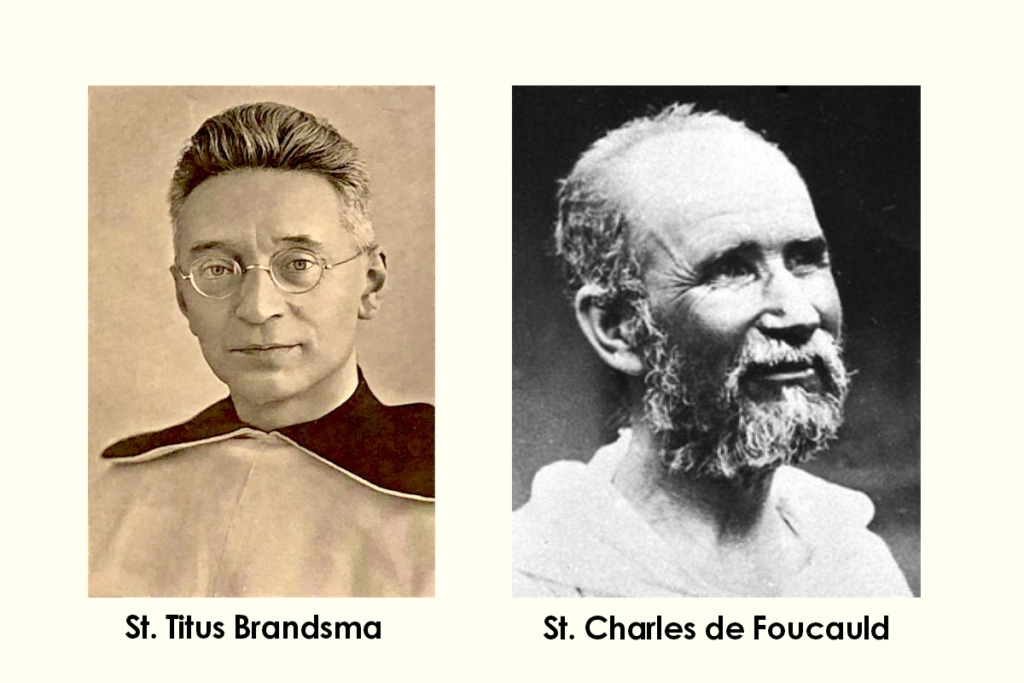Among the saints canonized May 15 by Pope Francis were two men whose lives exemplify what our world desperately needs, which is to recognize all people as children of God regardless of race, color or creed.
Carmelite Father Titus Brandsma and Father Charles de Foucauld, a Trappist, were 20th century priests who died for the faith, but their ministries couldn’t have been more different.
Brandsma was a Dutch priest who entered Carmel at the age of 17. He studied at the Gregorian University in Rome where he earned a doctorate in 1909 and returned to the Netherlands, where, as a writer, he translated the works of St. Teresa of Avila into the Dutch language.
In 1923, he became one of the founders of the Catholic University of Nijmegen, served on the faculty, specializing in philosophy and the theology of mysticism. When Hitler rose to power, Brandsma served as chaplain to the National Union of Catholic Journalists and was unrelenting in his condemnation of Nazi ideology.
Committed to the truths of the Catholic faith and to the independence of the press, he urged Catholic editors to avoid publishing propaganda pieces for National Socialism. Following the German conquest of Holland in 1940, Brandsma urged Dutch bishops to speak out against Nazi human rights violations, which included the persecution of Dutch Jews.
He personally distributed a letter from the Dutch to Catholic editors, which instructed journalists to disregard the regulation requiring Catholic newspapers and magazines to print official Nazi documents and articles.
Arrested by the Gestapo in 1942, Brandsma wrote, “I am already quite at home in my little cell…I am alone, certainly, but never has the Lord felt so near to me… Now he is my only refuge, and I feel secure and happy…I would stay here forever.” It was not to be. Eventually, the priest was transferred to the concentration camp at Dachau where he was executed.
Testifying at his beatification, the nurse who administered the lethal injection credited her return to the Church to him. Before he died, she told him that she was a “lost Catholic.” He responded by giving her his rosary and told her that he would pray for her.
At the age of 18, de Foucauld enrolled in a military academy and served in the French army. He was a lapsed Catholic but was so inspired by the faith of devout Muslims in the country where he was stationed that he decided to return to the Church.
Upon leaving the military, de Foucauld became a Trappist brother and worked as a carpenter for a group of Poor Clare nuns in Palestine. At the suggestion of the religious, he entered the seminary and was ordained a priest, though he continued to live a hidden life in imitation of the hidden years of Jesus in Nazareth.
After receiving permission from his superiors to live among the Muslim population in Tamanrasset, Algeria, he befriended Muslims in the region, where he was esteemed by them as a holy man. He died as a casualty of World War I at the hands of local tribesmen enlisted in the struggle for power.
In the confusion of a raid in which he was to be taken hostage, the priest was killed by a 15-year-old boy, which was believed to be accident. In a written meditation, found after his death, the saint imagined Jesus speaking to him saying, “It is love which should recollect you in me, not distance from my children. See me in them and like me at Nazareth, live near them, lost in God.”
Their canonizations couldn’t be timelier. At a time when racial divide has led to discrimination and death for people of color and journalism is often marred by opinion, misinformation and conspiracy theories, these men stand as beacons who reached beyond the boundaries of culture, religion and ideologies. Their prophetic voices bear witness to the world regarding the importance of the two greatest commandments: “To love God with our whole mind, and soul and strength and to love our neighbor as ourselves” (Mk 12:30-31).
Clearly, we stand on the shoulders of saints, who were willing to live the Gospel mandate without compromise. May we never forget that the cost of love is faith, and the price of discipleship is the cross. May we take courage in their example and ask them to intercede before God for a world that is desperately in need of finding its way to our Creator God not through violence, but through love.
Barbara Hughes is an author, retreat facilitator and spiritual guide. She lives in Virginia Beach and can be reached at [email protected].

